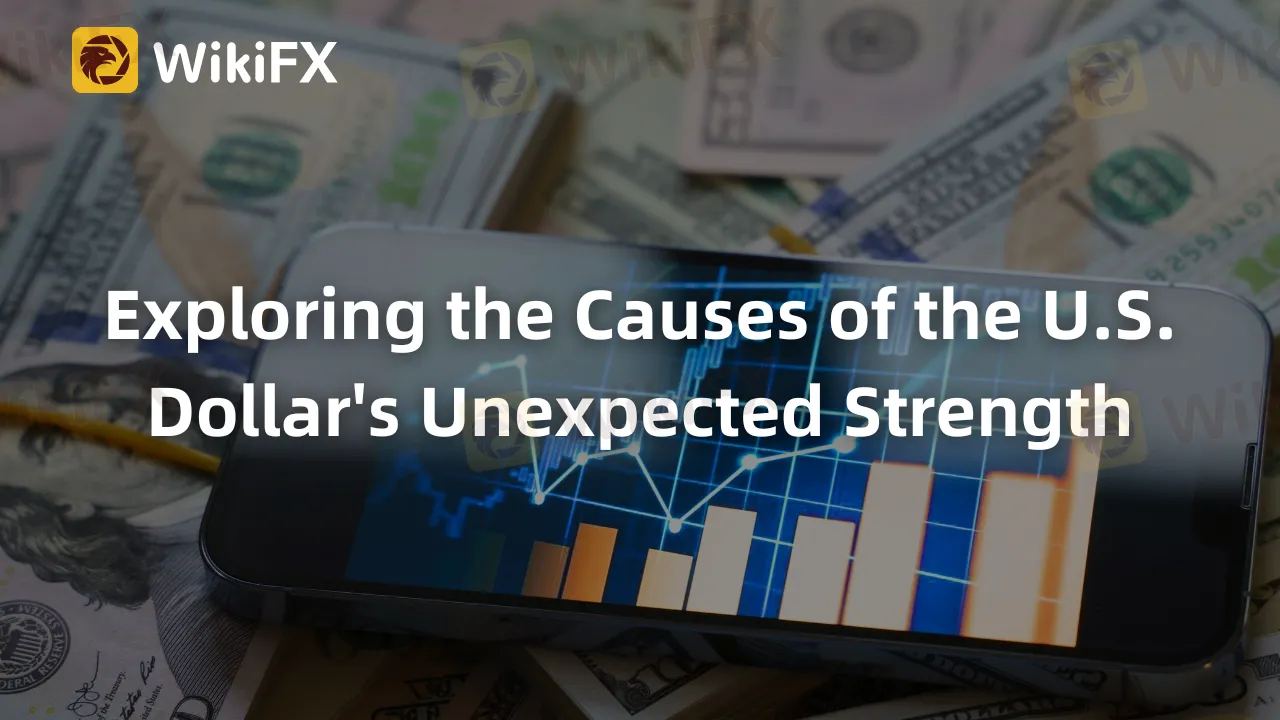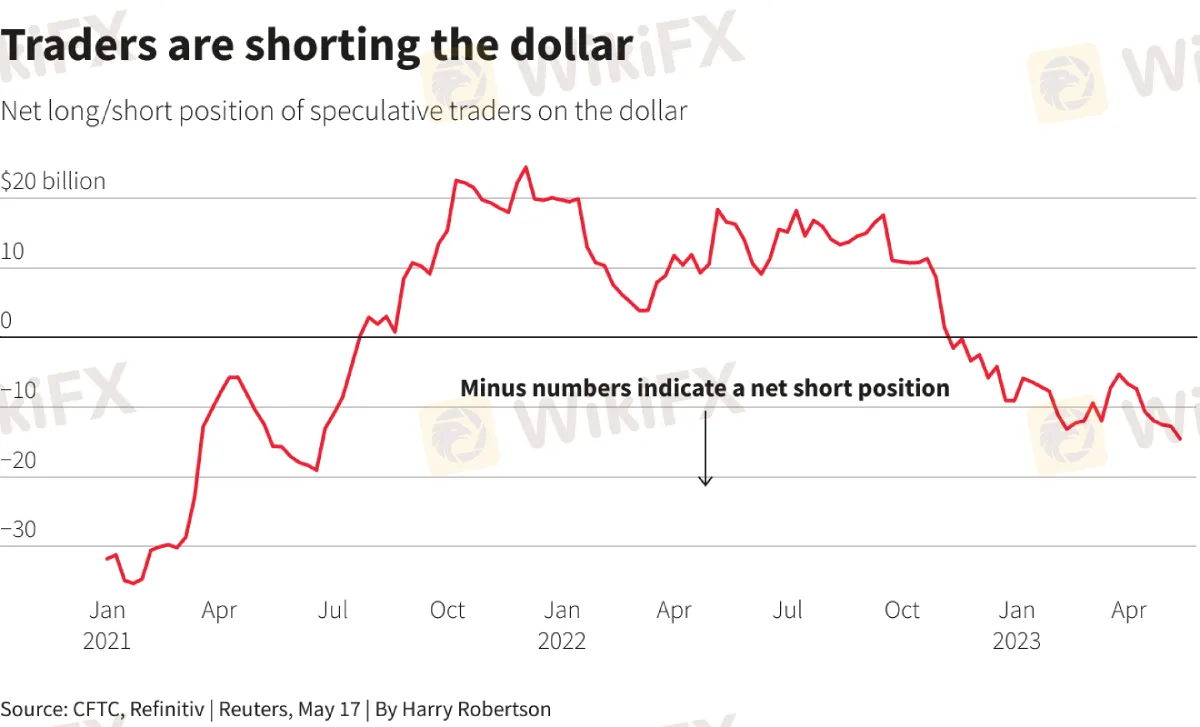简体中文
繁體中文
English
Pусский
日本語
ภาษาไทย
Tiếng Việt
Bahasa Indonesia
Español
हिन्दी
Filippiiniläinen
Français
Deutsch
Português
Türkçe
한국어
العربية
Exploring the Causes of the U.S. Dollar's Unexpected Strength
Abstract:The recent unexpected rise of the US dollar may be attributed to global uncertainties, potential reversal of Federal Reserve policies, and investor positioning. Factors such as US debt-ceiling concerns and inflation fears are fueling the currency's value despite market expectations of its decline.

Despite market agreement that the US dollar will decline, the currency stunned everyone by rising 2% in the previous month. This comes at a time when US inflation seems to be stabilizing and the Federal Reserve is indicating a halt in interest rate rises. Is the dollar's strength transitory or indicative of a change in economic conditions?
An Array of Contributing Factors
The surprise spike in the US dollar might be ascribed to a number of causes. The variety of global uncertainties is foremost among them, ranging from the battle over the US debt limit to the health of banks and the future of the global economy. Such concerns boost the dollar's allure as a safe haven, raising demand and, as a result, value.
The dollar index, which compares the US currency to six others, has risen by around 2% since mid-April, hitting approximately 103, albeit it is still nearly 10% down from the 20-year high of 114.78 sets last September. This rise is mostly related to market concern over the coming US debt-ceiling issue.
Uncertainties Around the Debt Ceiling
Democrats and Republicans are getting closer to reaching a deal on expanding the $31.4 trillion borrowing ceiling, but the possibility of a calamitous US debt default remains. This situation, coupled with concerns over potentially vulnerable banks, is pushing markets towards safer assets like bonds, gold, and dollars.
Esther Reichelt, the currency strategist at Commerzbank, states, “The recent USD strength is largely driven by increased safe-haven demand in view of 'unknown unknowns.'” Questions regarding the depth of vulnerabilities in U.S. regional banks and the potential fallout from the debt ceiling crisis have fueled this demand.

A Potential Fed Reversal?
While some analysts attribute the dollar's strength to “safe-haven” demand, Alvin Tan, head of Asia FX strategy at RBC Capital Markets, expresses skepticism. He contends that if such fears were at work, the stock market would exhibit a comparable uneasiness, which it has not. Instead, the S&P 500 index has been stable since mid-April and has gained more than 8% this year.
Fears that the Fed has yet to thoroughly combat inflation, according to Tan, may possibly be impacting the dollar's ascent. According to a recent University of Michigan study, consumer inflation expectations hit a five-year high of 3.2% in May, driving bond rates and the currency higher.

The Role of Investor Positioning
In an ironic twist, investor positioning against the dollar may be another factor contributing to its resurgence. Last week, the net short bets against the dollar by hedge funds and speculators amounted to $14.56 billion, marking the most significant such position since mid-2021.
This position could inadvertently drive a dollar rally. A minor rise in the dollar's value may force traders to close their short positions, leading to more dollar purchases and a subsequent increase in its value. As Chester Ntonifor, FX strategist at BCA Research, noted, “The dollar is very, very oversold.”
Conclusion
The U.S. dollar's recent rise, contrary to market expectations, highlights the complex and sometimes contradictory influences that shape currency movements. The interplay between technical and economic factors, coupled with geopolitical uncertainties, can lead to unexpected outcomes, underscoring the necessity of ongoing market vigilance.
Download and install the WikiFX App on your smartphone to stay updated on the latest news.
Download the App here: https://social1.onelink.me/QgET/px2b7i8n

Disclaimer:
The views in this article only represent the author's personal views, and do not constitute investment advice on this platform. This platform does not guarantee the accuracy, completeness and timeliness of the information in the article, and will not be liable for any loss caused by the use of or reliance on the information in the article.
Read more

The Ultimate Guide to Automated Forex Trading in 2025
Modern markets are revolutionized by automated trading systems, which now execute 70-85% of all transactions. These advanced automated trading software solutions, commonly called trading robots or Expert Advisors (EAs), leverage algorithmic precision for automatic trading across forex, stocks, and commodities 24/7. By removing emotional interference and executing trades in microseconds, auto forex trading platforms create fair opportunities for all market participants. For those new to automated trading for beginners, these systems provide disciplined, backtested strategies while significantly reducing manual effort.

Philippines Deports 29 Indonesians Linked to Online Scam Syndicate in Manila
Online scam groups in the Philippines trick Filipinos into gambling and love scams, from Manila to Bacolod, causing trafficking and pain as police fight back.

Why does your mood hinder you from getting the maximum return from an investment?
Investment decisions are rarely made in a vacuum. Aside from the objective data and market trends, our emotions—and our overall mood—play a crucial role in shaping our financial outcomes. Whether you’re feeling overconfident after a win or anxious after a loss, these emotional states can skew your decision-making process, ultimately affecting your investment returns.

How Reliable Are AI Forex Trading Signals From Regulated Brokers?
Discover how reliable AI Forex trading signals are and why using a regulated broker boosts their effectiveness. Learn key factors to evaluate accuracy and enhance your trading.
WikiFX Broker
Latest News
How Crypto Trading Transforms FX and CFD Brokerage Industry
UK would not hesitate to retaliate against US tariffs - No 10 sources
FCA Warns Against 10 Unlicensed or Clone Firms
CySEC Warns Against 14 Unlicensed Investment Websites
Top Currency Pairs to Watch for Profit This Week - March 31, 2025
Will natural disasters have an impact on the forex market?
Philippines Deports 29 Indonesians Linked to Online Scam Syndicate in Manila
Navigating the Intersection of Forex Markets, AI Technology, and Fintech
Exposed: Deceptive World of Fake Trading Gurus – Don’t Get Fooled!
AI-Powered Strategies to Improve Profits in Forex Trading
Currency Calculator







